I was struck by the thought that the last Neanderthals lived in what could be thought of as a post-apocalyptic world. They were going extinct. Did they notice? What kind of world did the last survivors live in?
It's doubtful that Neanderthals had any concept of extinction, of course, at least on a continent-wide or global scale. Yet you can imagine that there may have been some sense that something had gone terribly wrong, perhaps a recognition of an unyielding process that was squeezing them out, that the world was taking a new direction without them. Extinction was gradual, taking place over generations, and therefore most likely difficult to recognize.
They were living in a post-apocalyptic world. Nature had turned against them. They were being threatened by alien invaders with new, powerful weapons. Perhaps the Neanderthals were doing each other in, resorting to cannibalism and inter-tribal violence in their desperation. Did their society begin to crumble as their numbers dwindled, or as previously predictable rhythms of nature shifted? Were there lost traditions, passed-on legends of long-gone better days? With a little imagination, it's easy to think of the Neanderthals in a classic, end of the world sci-fi context. What is it like to be a member of a self-aware, intelligent species that is dying away? What is it like to be the very last living members of that species?
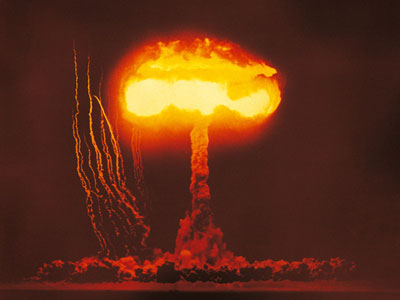 My somewhat unmoored speculation has driven me to immerse myself in post-apocalyptic science fiction. This project is not only fun, but also an interesting study of fictional takes on science. Post-apocalyptic fiction obviously isn't only (or even primarily) about science, but it is an excellent form in which to explore questions about the role of science as a mediator between humans and nature.
My somewhat unmoored speculation has driven me to immerse myself in post-apocalyptic science fiction. This project is not only fun, but also an interesting study of fictional takes on science. Post-apocalyptic fiction obviously isn't only (or even primarily) about science, but it is an excellent form in which to explore questions about the role of science as a mediator between humans and nature.Science is remarkable because it is an extremely successful method for understanding and controlling nature by intellectual effort. Neanderthals, and their modern human neighbors, lived in close proximity to nature, and were engaged in a constant battle for survival. Most of us encounter the struggle for survival remotely, listening to the unflappable British voice of David Attenborough as we watch kangaroo rats, lions, elephant seals, and wildebeest relentlessly pursuing food and mates in a world where small, careless errors and weaknesses are punished with casual brutality. Neanderthals and other early humans lived in that world.
Science and technology have proven the most effective means to "turn the tide" in our battle with nature (as Aldous Huxley put it, with some bitterness, in his post-nuclear novel, Ape and Essence). Science is a mediator between humans and nature. This mediating role rests on the ability science gives us to predict, control and manipulate nature. Even science done out of pure curiosity is based on control: in order to obtain scientific knowledge, we manipulate nature by doing experiments. The prime test of our scientific theories is how predictive they are, how well they enable us to manipulate nature with predictable results. From a scientific perspective, is impossible to understand nature without controlling it.
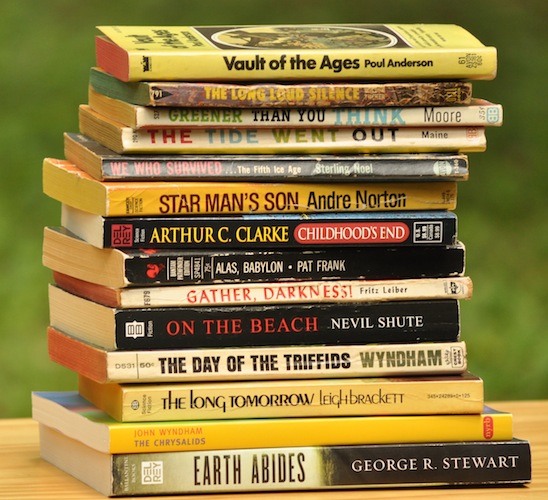 Post-apocalyptic science fiction describes situations in which our ability to predict and control fails catastrophically. Nature escapes our control, through world-wide plagues, collisions with asteroids, or invasions by alien species; or else we're done in by our own efforts at control, by nuclear war or human-induced ecological catastrophe.
Post-apocalyptic science fiction describes situations in which our ability to predict and control fails catastrophically. Nature escapes our control, through world-wide plagues, collisions with asteroids, or invasions by alien species; or else we're done in by our own efforts at control, by nuclear war or human-induced ecological catastrophe.Thus End of the World science fiction is a fine setting for fiction writers to explore the relationship between science and society. To what extent does civilization depend on the ability to control nature, i.e., depend on technology? How do our relationships with each other depend on the security of scientific control? Are there dark (animal?) elements of human nature, kept normally under wraps by civilization, that surface when science fails and civilization cracks up? In other words, how much does being human depend on how we relate to nature? What are the negative side-effects of our scientific quest to render nature tame and predictable? Have we deluded ourselves into believing we have more control than we really possess? Extinction is what happens when a species loses the battle for survival, and the Neanderthals lost. Is it possible that we could lose as well?
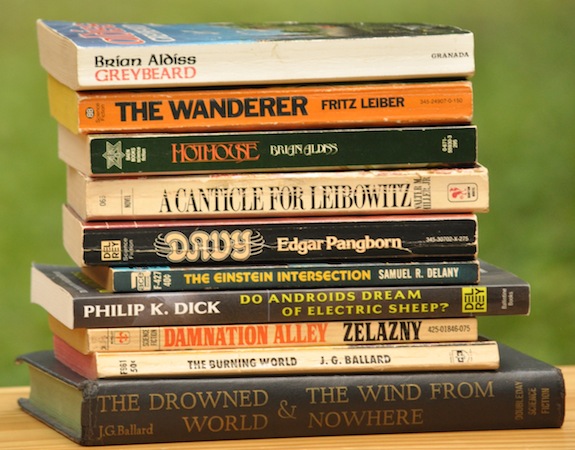 Intentionally or not, most post-apocalyptic sci-fi touches on these themes to some degree, and so, to commemorate both the sequencing of the Neanderthal genome and the release of The Road, I'm going to embark on a post-apocalyptic sci-fi project: The road to The Road, 60 years of End of the World fiction.
Intentionally or not, most post-apocalyptic sci-fi touches on these themes to some degree, and so, to commemorate both the sequencing of the Neanderthal genome and the release of The Road, I'm going to embark on a post-apocalyptic sci-fi project: The road to The Road, 60 years of End of the World fiction.Inspired by this excellent series of blog posts on 50 years of Hugo awards, I'm going to blog about one End of the World novel for each year from 1947 to 2006. 60 years, 60 novels. Why 60? There are excellent apocalypse novels in the first half of the 20th century (like these and these), but after 1947, there are enough choices out there in this genre to make it feasible to choose one book for each year.
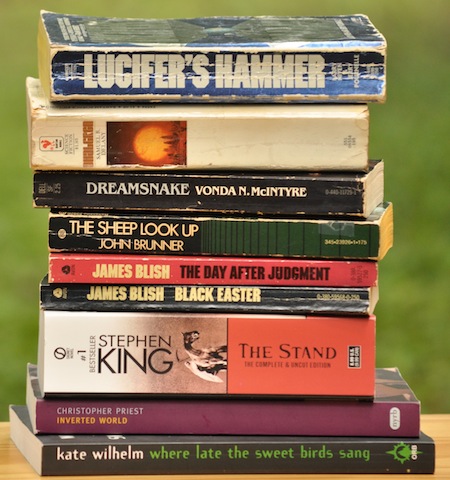 And now for the inevitable genre definition: my criteria for inclusion are shaped by my Neanderthal speculations. I'm interested in books that deal with the possible extinction of humanity, or a large portion thereof - whether by alien invasion, ecological ruin, plague, nuclear war, or some other destructive force. I'm including pre- and post-apocalypse scenarios. Books about post-catastrophe survival, or civilization coming unraveled in the face of an overwhelming threat are in, books about stable dystopias (such as 1984) are not. A holocaust that occurred deep in the past doesn't count if it's merely a setting for fantasy novel - the end of civilization, even hundreds of years in the past, has to be central to the book. The threat of extinction however isn't absolutely necessary; a destabilizing interaction with other intelligent life forms also works (as in Philip Dick's Do Androids Dream of Electric Sheep?). Generally, I'm also sticking to stand-alone novels, although it should be noted that some excellent post-apocalyptic series exist.
And now for the inevitable genre definition: my criteria for inclusion are shaped by my Neanderthal speculations. I'm interested in books that deal with the possible extinction of humanity, or a large portion thereof - whether by alien invasion, ecological ruin, plague, nuclear war, or some other destructive force. I'm including pre- and post-apocalypse scenarios. Books about post-catastrophe survival, or civilization coming unraveled in the face of an overwhelming threat are in, books about stable dystopias (such as 1984) are not. A holocaust that occurred deep in the past doesn't count if it's merely a setting for fantasy novel - the end of civilization, even hundreds of years in the past, has to be central to the book. The threat of extinction however isn't absolutely necessary; a destabilizing interaction with other intelligent life forms also works (as in Philip Dick's Do Androids Dream of Electric Sheep?). Generally, I'm also sticking to stand-alone novels, although it should be noted that some excellent post-apocalyptic series exist. 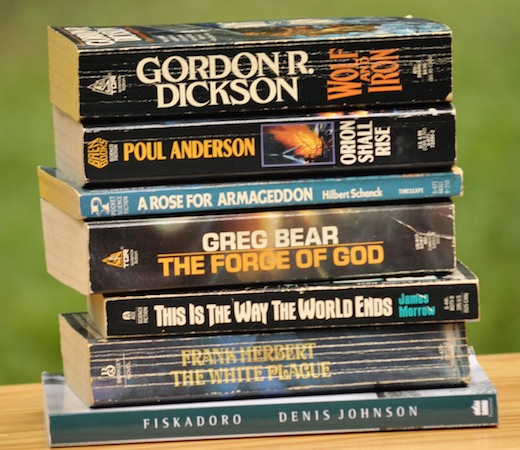 And so, below is my proposed chronological curriculum for 60 years of End of the World Sci-Fi, based on when a work was first published in book form. I've listed the books I propose to read, and, in some years, other great books worth checking out. Availability may be a problem for some of these books, and so I'm still looking for suggestions for books first published in 1970, 1979, 1981.
And so, below is my proposed chronological curriculum for 60 years of End of the World Sci-Fi, based on when a work was first published in book form. I've listed the books I propose to read, and, in some years, other great books worth checking out. Availability may be a problem for some of these books, and so I'm still looking for suggestions for books first published in 1970, 1979, 1981. I'm drawing a complete blank for the year 2000 (it can't be possible that no good End of the World sci-fi was published in Y2K!!).
I could also use some alternate suggestions for 1996, 1998, 2001, 2002, and 2005.
Inevitably, this is primarily a list of works in English. I'm not familiar with recent post-apocalyptic works in other languages, but I'm open to suggestions. I have no idea whether post-apocalyptic novels are most popular in English, or if I've just missed a huge literature outside of the US and the UK. The Russians seem to have a fairly strong post-apocalyptic tradition, but I'm only familiar with a handful of Russian sci-fi books.
Read along, comment about a different book for a given year, and offer your insights into these books about the apocalyptic future.
1947 - Greener Than You Think, Ward Moore
1948 - Ape and Essence, Aldous Huxley
1949 - Earth Abides, George Stewart
1950 - Genus Homo, L. Sprague de Camp and P. Schuyler Miller (Also noteworthy is Judith Miller's Shadow on the Hearth, and Ray Bradbury's Martian Chronicles were published in book form this year.)
1951 - The Day of the Triffids, John Wyndham
1952 - The Long Loud Silence, Wilson Tucker (Also Star Man's Son, Andre Alice Norton, and Vault of the Ages, Poul Anderson.)
1953 - Childhood's End, Arthur C. Clarke (Also noteworthy are Henry Kuttner's Mutant and John Wyndham's The Kraken Wakes.)
1954 - I Am Legend, Richard Matheson (See also The Dark Millennium, by A.J. Merak.)
1955 - The Long Tomorrow, Leigh Brackett (See also The Chrysalids, John Wyndham.)
1956 - No Blade of Grass, John Christopher
1957 - On The Beach, Nevil Shute
1958 - The Tide Went Out, Charles Eric Maine
1959 - Alas, Babylon, Pat Frank (See also We Who Survived, Stirling Noel.)
1960 - A Canticle for Leibowitz, Walter Miller (And Dark December, Alfred Coppel.)
1961 - The Wind From Nowhere, J.G. Ballard
1962 - Hothouse, Brian Aldiss (See also The Drowned World, J.G. Ballard)
1963 - Cat's Cradle, Kurt Vonnegut
1964 - The Burning World, J.G. Ballard (See also The Penultimate Truth, Philip Dick, The Wanderer, Fritz Leiber, and Greybeard, Brian Aldiss)
1965 - The Genocides, Thomas Disch (Also Dr. Bloodmoney or: How We Got Along After The Bomb, Philip Dick.)
1966 - This Immortal, Roger Zelazny (See also Edgar Pangborn's The Judgment of Eve and The Crystal World, J.G. Ballard)
1967 - The Einstein Intersection, Samuel Delany (See also Ice, Anna Kavan)
1968 - Do Androids Dream of Electric Sheep?, Philip K. Dick
1969 - Damnation Alley, Roger Zelazny
1970 - The Day After Doomsday, Rena Vale (Also The Incredible Tide, Alexander Key)
1971 - The Day After Judgment, James Blish
1972 - The Sheep Look Up, John Brunner (And Roadside Picnic, by the Strugatsky brothers.)
1973 - Hiero's Journey, Sterling Lanier (And Edmund Cooper, The Cloud Walker.)
1974 - Inverted World, Christopher Priest
1975 - Dhalgren, Samuel Delany
1976 - Where Late The Sweet Birds Sang, Kate Wilhelm (Also Deus Irae, Philip Dick and Roger Zelazny.)
1977 - Lucifer's Hammer, Larry Niven and Jerry Pournelle
1978 - Dreamsnake, Vonda McIntyre (See also The Stand, Stephen King)
1979 - Down to a Sunless Sea, David Graham (See also, The Hitchhiker's Guide to the Galaxy, Douglas Adams, Engine Summer, John Crowley, and Shikasta, by Doris Lessing.)
1980 - Riddley Walker, Russell Hoban
1981 - Starship and Haiku, Somtow Sucharitkul (See also The Quiet Earth, Craig Harrison.)
1982 - A Rose for Armageddon, Hilbert Schenk
1983 - Orion Shall Rise, Poul Anderson
1984 - The Wild Shore, Kim Stanley Robinson (And Emergence, David Palmer.)
1985 - Fiskadoro, Denis Johnson (See also The Postman, David Brin, This Is The Way The World Ends, James Morrow, and The World Ends in Hickory Hollow, Ardath Mayhar)
1986 - Nature's End, Whitley Strieber and James Kunetka (See also, Watchmen, Alan Moore and David Gibbons)
1987 - The Forge of God, Greg Bear (See also Swan Song, Robert McCammon)
1988 - At Winter's End, Robert Silverberg (See also The Last Ship, William Brinkley)
1989 - Lilith's Brood (Xenogenesis), Octavia Butler
1990 - Wolf and Iron, Gordon Dickson (See also, A Gift Upon The Shore, M.K. Wren)
1991 - Fallen Angels, Larry Niven, Jerry Pournelle, and Michael Flynn
1992 - Children of Men, P.D. James
1993 - The Parable of the Sower, Octavia Butler
1994 - Queen City Jazz, Kathleen Ann Goonan
1995 - Amnesia Moon, Jonathan Lethem
1996 - The Killing Star, Charles Pellegrino and George Zebrowski
1997 - Eternity Road, Jack McDevitt (Also In The Country of Last Things, Paul Auster.)
1998 - Aftermath, Charles Sheffield
1999 - Mara and Dann, Doris Lessing
2000 - The Slynx, Tatyana Tolstaya (original Russian publication was in 2000)
2001 - The Night of the Triffids, Simon Clark, or possibly The Aftermath, Samuel Florman
2002 - The Tain, China Mieville or The Year Zero, Jeff Long (See also, Y: The Last Man, Brian Vaughn and Pia Guerra)
2003 - Oryx and Crake, Margaret Atwood
2004 - Dies the Fire, S.M. Stirling
2005 - It's only Temporary, Eric Shapiro
2006 - The Road, Cormac McCarthy (Also Max Brooks, World War Z.)
As I write about each book, I will put the links here, so check back.
First up: The end of the world as farce, in Ward Moore's 1947 Greener Than You Think.

Read the feed:






Comments